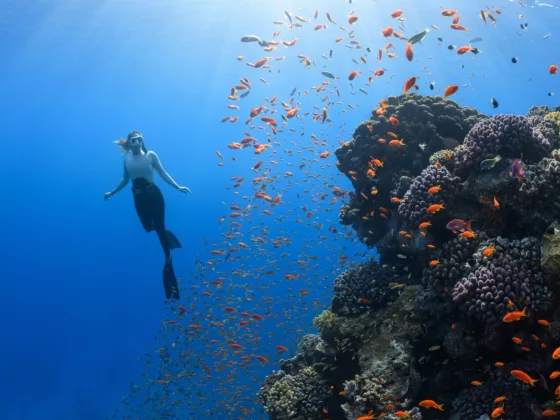13 Basic Safety Rules for Freedivers
Freediving offers an incredible way to explore underwater worlds on a single breath. But like any water sport, it comes with real risks that need your attention. The good news? Most accidents can be prevented by following basic safety rules for freedivers. Whether you're just starting out or have been diving for years, these basic safety rules for freedivers will help keep you and your diving partners safe in the water.
1. Never Dive Alone

This is the number one basic safety rule for freedivers, and there's a good reason why. Your buddy can watch for signs of trouble, help with rescues, and call for emergency help when needed. Even experienced freedivers rely on their dive partners.
Choose a partner who matches your skill level and knows basic safety rules for freedivers and rescue procedures. Make sure they can actually help you if something goes wrong.
A good buddy should be able to dive down at least 15 meters to assist you if needed.
2. Follow the One Up, One Down Rule

When diving with a partner, only one person should be underwater at a time. This essential safety rule ensures someone is always watching from the surface. The surface person acts as your safety diver and can respond quickly if problems arise.
Your buddy should meet you during the last 15 meters of your ascent - this is where most blackouts happen according to basic safety rules for freedivers.
3. Don't Hyperventilate Before Diving

Many beginners think taking lots of deep, fast breaths before diving will help them hold their breath longer. This violates one of the most important basic safety rules for freedivers and is dangerous.
Hyperventilation removes too much carbon dioxide from your blood, which can delay the urge to breathe and increase your risk of blackout. Instead, take 3-4 normal deep breaths before your dive.
Listen to your body's signals about when to return to the surface.
4. Equalize Early and Often

Start equalizing your ears every 3 meters as you descend. Never force an equalization - if it doesn't work easily, abort the dive and return to the surface. Pushing through equalization problems can cause serious ear injuries. Learn different equalization techniques so you have options underwater.
If one method doesn't work, try another.
This is one of the basic safety rules for freedivers that prevents serious injuries.
5. Use Proper Recovery Breathing
After every dive, perform recovery breathing to replenish oxygen levels and remove excess carbon dioxide. This helps prevent blackouts and gets your body ready for the next dive.
Take at least one big breath immediately after surfacing. Make this a habit after every dive, no matter how easy it felt. Recovery breathing is among the most critical basic safety rules for freedivers.
6. Respect Your Limits

Don't try to push your depth or time limits on every dive. Leave yourself a safety margin and avoid taking every dive to your maximum. Your limits can change based on how you're feeling, water conditions, and other factors.
If you're planning maximum depth dives, limit yourself to no more than 2 per training session. For dives deeper than 50 meters, stick to one dive per day. These basic safety rules for freedivers help prevent decompression issues.
7. Take Proper Surface Intervals

With dives up to 40 meters, rest for at least 3 times longer than your total dive time. For deeper dives, divide your maximum depth by 5 to get your minimum rest time in minutes.
During your surface interval, you can't act as a safety diver. Let your body fully recover before your next dive. Understanding surface intervals is essential among basic safety rules for freedivers.
8. Stay Hydrated and Well-Fed

Drink lots of water before freediving sessions, as dehydration increases blackout risk and makes equalization harder. Don't dive when you're very hungry or right after a big meal.
Wait at least 4 hours after a full meal or 2 hours after a light snack before diving. Your body needs blood flow to your brain, not your digestive system.
Proper nutrition and hydration are fundamental basic safety rules for freedivers.
9. Use Proper Equipment
Always dive with a bright-colored buoy (orange, red, or yellow) that's visible to boats. The buoy should be large enough not to be pulled underwater, even by two divers ascending together.
For deeper dives, poor visibility, or strong currents, use a safety lanyard connected to your line. This keeps you connected to the surface and helps your buddy find you. Equipment safety is covered in all basic safety rules for freedivers.
10. Know the Signs of Trouble

Learn to recognize the early signs of hypoxia (low oxygen) in yourself and your buddy. These include confusion, poor judgment, and unusual behavior underwater.
If someone blacks out, get them to the surface immediately, establish positive buoyancy, remove their mask and snorkel, and provide rescue breathing if needed. Emergency recognition skills are vital in basic safety rules for freedivers.
11. Don't Mix Scuba and Freediving
Wait at least 12 hours after scuba diving before freediving. The nitrogen in your tissues from scuba diving can cause serious problems when compressed and expanded during freediving.
This waiting period is one of the basic safety rules for freedivers that many people overlook but can prevent decompression sickness.
12. Avoid Diving When Conditions Aren't Right
Don't dive when you're tired, stressed, congested, or have been drinking alcohol. These conditions impair your judgment and breath-holding ability.
Cold water significantly reduces your breath-hold time and increases blackout risk.
If you feel cold, your diving ability is already compromised.
13. Get Proper Training

Take a freediving course from a certified instructor. Proper training provides essential knowledge about techniques, safety measures, and emergency response procedures.
Practice rescue techniques until they become second nature. In an emergency, you won't have time to think - you need to act automatically. Training covers all the basic safety rules for freedivers comprehensively.
The Bottom Line
Freediving can be incredibly rewarding when done safely. These basic safety rules for freedivers exist because they save lives. Following them doesn't make you a beginner - it makes you smart.
Remember, most freediving accidents happen to experienced divers who got comfortable and started cutting corners on safety. Don't let that be you.
Start with proper training, always dive with a qualified buddy, and respect your limits. The ocean will always be there for your next dive. By following these basic safety rules for freedivers, you'll enjoy many safe underwater adventures.
Goes along
You might also like

Top 10 Dive Watches of 2024

XiaoTun AJ‑03: The Underwater Jetpack Revolution

SCUBAPRO HYDROS PRO 2

KikFin Shark – Unleash Your Oceanic Power

5 Best Snorkel Sets for Adults: Complete Guide to Underwater Adventures



